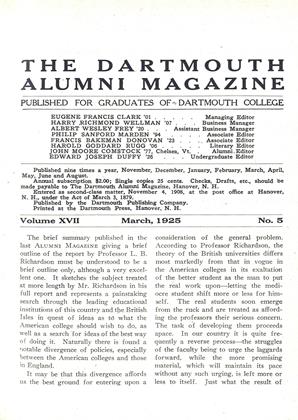By Herbert Adolphus Miller, Ph.D. '99, Philadelphia: J. B. Lippincott Company, 1924. xvii+196 pp.
In most recent years there have been three outstanding influences contributing to the development of sociology. The first of these is from the growth of the science of statistics, as applied to definite sociological investigation. The second influence has come from the work of anthropologists, notable the Boas school, who have ably demonstrated the necessity for recognition of the cultural factor in the analysis of social behavior, and who have done much to minimize the influence of the alarmist biological school. The third impetus comes with the development of the newer psychology, dating back chiefly to the work of Freud and his followers. Their principal contribution has been in showing the unconscious motivation of human activity, individual and group, and their insistence upon the rejection of the rather naive doctrine of man as a .totally self-conscious and self-directing organism.
Professor Miller has combined these last two mentioned points of view in his volume. His recognition that differences between groups of the human family are more clearly cultural than biological, places him definitely among the growing number of "cultural sociologists." His use of the doctrine of repression, and modified Freudianism, classes him. with Graham Wallas, A. B. Wolfe, William F. Ogburn, E. D. Martin, and the late Carleton Parker.
The thesis that Professor Miller develops is simple: the antagonisms arising from race and class antipathies are the logical and inevitable outcome of the working of clearly understandable psychological laws. Oppress a people or a class, balk their desires—to use Wallas' term —or cramp their expression, and there will be an immediate compensatory reaction. The Jew, the Negro, the central Europeans—all of these and others discussed in the volume are victims of repression, and show the unmistakable symptoms of psychopathic disorder.
The escape from all of this is not, in Professor Miller's opinion, a further insistence upon repression. His whole analysis aims to demonstrate, and does, that force is useless in dealing with the heterogeneity of social groups. They, cannot be forced into conformity, and it is not desirable that they should be. This applies especially to our Americanization programs. The escape from disorder in our own society, as that disorder comes from racially different stock, is not through a further insistence upon the banalities of "Americanization," but rather from a growth in the numbers recognizing that such programs are actually repressing forces. The attempts to force immigrant and foreign stocks to conform absolutely to our ways, by insisting on one language and culture tend only to make the "Americanized" individuals more remote from us. Professor Miller's argument here is as keen as any to be found in" recent sociological literature. His reasoning is sharp, his logic is without mercy for old and out worn traditions, and his conclusions are hopeful. It is only Nordics, Ku Kluxers, and 100% Patriots that will squirm as they read what he has written. All in all, this book is probably the best and ablest presentation of the case for what P. A. Means has called "race appreciation."
Mr. Lewis Parkhurst '78 is the author of a fifteen page pamphlet addressed "To the BusinessMen of Massachusetts" regarding the old state prison at Charlestown.
"Cod-liver Oil and its By-products" by Arthur D. Holmes '06 has been reprinted from the December issue of the Journal of the American Pharmaceutical Association.
Harry I. Marshall 1900 and Emma W. Marshall are the authors of a memorial volume of 62 pages issued in memory of Daniel Appleton White Smith. Mr. Marshall with Thara Po Ngai is the author of Manual of Hygiene andSanitation." This volume "printed by the Ruggles Text book fund for the Karen Theological Seminary" is written in Burmese and printed at the American Baptist Press, Rangoon, Burma.
The January issue of the Granite Monthly contains an article "History of New Hampshire Schools" by E. W. Butterfield '97. The same magazine contains an article by Henry Bailey Stevens 'l2 "Entire State Campus of Extension Service."
 View Full Issue
View Full Issue
More From This Issue
-
 Article
ArticleTHE RELATION OF COLLEGE TO LIFE
March 1925 -
 Article
ArticleThe brief
March 1925 -
 Article
ArticleHANOVER'S MOUNTAINS
March 1925 By Nathaniel L. Goodrich -
 Class Notes
Class NotesBOSTON ASSOCIATION
March 1925 -
 Article
ArticleFROM THE UNDERGRADUATE CHAIR
March 1925 -
 Article
ArticleTHE ARCHITECTURE OF DARTMOUTH
March 1925 By J. Frederick Larson
MALCOLM M. WILLEY
Books
-
 Books
BooksFaculty Authors
November 1944 -
 Books
BooksAuthentically Yankee
JANUARY/FEBRUARY 1983 By CHARLES G. BOLTE '41 -
 Books
BooksWILD BIRDS AT HOME
November 1935 By Dr. Frederic P. Lord '98 -
 Books
BooksExperiential Education
OCTOBER 1981 By Michael Colacchio '80 -
 Books
BooksFreedom's Mirage
May 1980 By Nelson Kasfir -
 Books
BooksFUNDAMENTALS OF SOCIAL SCIENCE
October 1946 By Robert K. Carr '29



